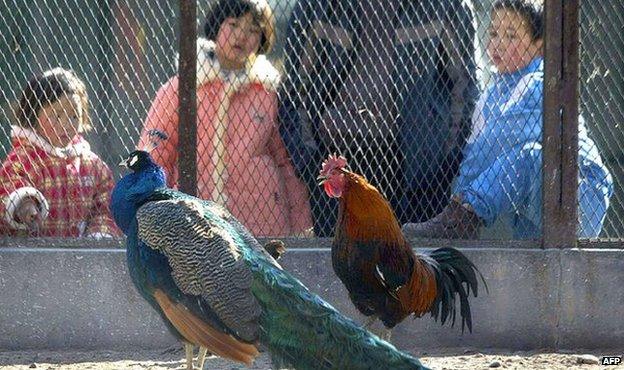China: Animal centres used to help predict earthquakes
- Published

Several recent studies observed changes in animal behaviour prior to major quakes
Chinese scientists are using animals to try to predict when an earthquake may strike, it's reported.
Seismologists in Nanjing, the capital of eastern Jiangsu province, have set up seven observation centres at zoos and animal parks in the region, the Modern Express website reports, external. They'll be watching for changes in behaviour among thousands of animals, which might be a sign of an imminent tremor. An ecological park in the city's Yuhuatai district has become one of the seismic monitoring sites, with 2,000 chickens, 200 pigs and 2 sq km (0.8 sq miles) of fish ponds, the report says. Cameras have been installed around the park, and staff will report back to the seismological bureau on the animals' behaviour twice a day.
"Animals sometimes become stressed before an earthquake," says Zhao Bing, Nanjing Seismological Bureau's chief of scientific monitoring. But the occasional bit of oddness from one chicken doesn't necessarily spell trouble, so groups of animals are being observed, "so that their behaviour can be cross-checked", he explains. A member of staff at Hongshan Forest Zoo, another monitoring site, says animals can be just as effective as specialist technology when trying to predict a quake. "Birds can become 'nervous' - if their tails are wagging like a dog's, you should pay attention," Shen Zhijun tells the paper.
It has long been thought that animal behaviour could provide an early warning of seismic activity. In 2011, scientists said animals may be able to detect chemical changes in groundwater which precede a quake. Their study was prompted by a colony of toads abandoning its pond in the Italian city of L'Aquila days before it was devastated by a 6.3 magnitude quake. Another study observed changes in wild animal behaviour, external in the three weeks before Peru's 7.0 magnitude earthquake in 2011.
Next story: Snack companies do battle over square crisps in Denmark
Use #NewsfromElsewhere to stay up-to-date with our reports via Twitter, external.